Panait Istrati & A.M. De Jong
A Friendship for the Ages
It was a friendship that lasted for almost ten years and made literary history. They shared socialist ideals, a belief in art as a tool for social betterment and a profound mutual affection from the first moment they met. The Dutch journalist and novelist, A.M. (Adriaan) de Jong, and the Greek-Romanian vagabond and jack-of-all-trades, Panait Istrati, who, writing in French, became an internationally well-known novelist, met in the summer of 1927, when Istrati visited De Jong at his house in the south of The Netherlands.
De Jong first came into contact with Istrati’s work at the end of 1926, when the Amsterdam publishing house Kosmos asked his opinion about Istrati’s writing and, in case he liked it, whether he would be interested in translating one of his novels. Although he initially had some doubts about Istrati’s sudden international fame, which he suspected to be a hype, De Jong was very impressed by what he read: “Not a writer by profession, not a man of letters by trade, but a great and fiery man, who narrated straight from the heart, with passionate howls, a colorful, fierce, uprooted and tumultuous life, an insatiable and intoxicating lust for life, a wild but great and good man.”
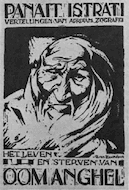
De Jong warmly recommended Istrati’s novel Moș Anghel (Uncle Anghel) to be translated into Dutch and wrote to the publisher that his wife Co was willing to produce a first draft, which he would polish up. (In the end, he took full credit for the work, and his wife was not even mentioned as a translator.) Because Istrati’s French wasn’t always clear to De Jong, he got in touch with the Romanian author, who was staying in a sanatorium in Switzerland at the time. Istrati answered him right away. This marked the beginning of a correspondence, in French, and a friendship that would last until Istrati’s death of tuberculosis in March 1935. Istrati visited De Jong and the Netherlands many times, and the two spent several summer vacations together – and together with their partners – in France.
The story of their fascinating friendship goes hand in the hand with the story of the translation of texts written by A.M. De Jong about Istrati’s work and their encounters. In 2012, the translator of Romanian literature into Dutch, Jan Willem Bos, while working on the translation of Mircea Cărtărescu’s trilogy Orbitor, came across a collection of articles by De Jong written between 1927 and 1937 about Panait Istrati. This collection, never before translated into Romanian, included two texts of literary criticism on Istrati’s work, a ten-part series of articles about De Jong’s trip to Romania between the 24th of June and the 23rd of December 1933, and 25 articles about De Jong’s encounters with Istrati. The texts, translated into Romanian by Alexa Stoicescu, are of great literary and historical value. First of all, they tell the story of a special friendship between two very different personalities: the sober Dutchman and the passionate Romanian. Secondly, they present an accurate account of interwar Romania on a bumpy road to modernity.
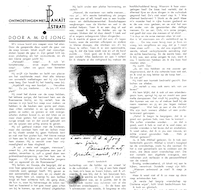
One of the texts that recount De Jong's encounters with Istrati
De Jong was a respected novelist in his own right, and has assured himself a place in Dutch literary history with his cycle of novels Merijntje Gijzens Jeugd (Merijntje Gijzen’s Youth), which made him a best-selling author in the Netherlands. After giving up his job as a teacher, he worked as a journalist for several left-leaning political and cultural publications, like NU (NOW), of which he was a co-founder, and De Notenkraker (The Nutcracker). In these magazines he published some of Istrati’s short stories and wrote several articles about the man and his work. Among these was the series of articles “Ontmoetingen met Panait Istrati” (Encounters with Panait Istrati).
The two writers, both from a more than modest social background, were convinced that their writings were necessary tools in the social struggle of the time. As De Jong wrote to Istrati: “After all, you and I don’t make literature: we fight and books are our weapons, that is all.”
You cannot make an omelet without breaking eggs
Although they were both convinced leftists, they did not really see eye to eye on many aspects of the international socialist movement, especially when it came to the Soviet Union. Istrati believed initially that their political ideals were being implemented in the Soviet Union, but De Jong had grave doubts. In a letter sent from Athens, Istrati asks his friend to support the Soviet cause, even if he is not a communist, “in the fight against the despicable attacks of the criminal gang that oppresses us, exploits us, kills us.”
But Istrati’s enthusiasm was not to last. During his visits to Soviet Union in 1927 and 1929 he came to realize that this country did not offer humanity the future it aspired to. Nor was he convinced by the writer Victor Serge’s defence, who found excuses for the many abuses by quoting the old dictum “You cannot make an omelet without breaking eggs”. “I see the broken eggs,” Istrati famously countered. “But where is the omelet?” After the scales had fallen from his eyes, Istrati was devastated: “For me, it is all over. This is not a normal, banal disappointment. I had built everything on my faith in the purity of Communist Russia. And Russia destroyed that faith.” He wrote a trilogy about his negative experiences called Vers l’autre flamme (translated into English as The Confession of a Loser), which resulted in his ostracism by his former comrades, who had pleaded with him not to publish the books because they would only benefit Western capitalism and undermine the socialist cause. However, Istrati was not deterred. De Jong felt for his friend: “It goes without saying that for the ‘one hundred percent communists’ [Istrati] is now a traitor, a sold soul, a lackey of the capitalists, a counter-revolutionary, in short, a monster devoid of honor. As for myself, I never loved this friend, whom I discovered too late, better than after this act of desperate honesty, through which he consciously created an almost unbearable loneliness around his restless and troubled life.”
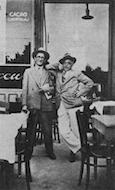
Panait Istrati and A.M. de Jong posing in Brăila, Romania
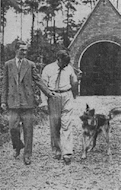
The two writers at De Jong's house in 1933
Istrati’s disillusionment with the “actual existing socialism” did not stop him from traveling to Amsterdam in late 1929 in order to seek De Jong’s support in an ill-fated attempt to obtain political asylum in the Netherlands for Leon Trotsky, who at that time was living in exile in Turkey. While his friend was staying at his house, waiting for an answer from the Dutch government, De Jong spoke for the first time on Dutch radio. The subject of his talk was, naturally, Panait Istrati.
After the failure to obtain asylum for Trotsky, the two friends made elaborate plans for a trip to the Near East. This also ended in failure, as Istrati was prohibited by the authorities to disembark in Cairo, even though his documents were in order. Obviously, they didn’t want to let the by now infamous communist into the country. De Jong continued the journey on his own and afterwards published a series of 18 articles about his experiences under the general title: “Without Panait Istrati in the Near East”.
De Jong visits Romania
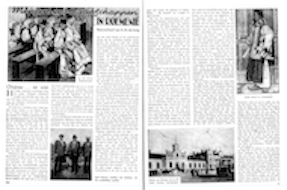
One article about the trips that De Jong did in Romania
In 1932, Istrati visited De Jong in his new house in the town of Bilthoven. During his stay, he invited his Dutch friend to come and see him in Romania. Even though he noticed Istrati’s health had deteriorated, De Jong took him up on it, traveling to Romania in the spring of that same year, a visit which resulted in a series of ten articles under the heading “People and Places in Romania.”
In the spring of 1935, Istrati succumbed to the tuberculosis that he had been suffering from for many years. A year later, De Jong honored his friend’s memory by giving a lecture about the man and his work for the Netherlands-Romania Association. “The truth is that for me Istrati did not remain only the great writer about whom one can speak with an exclusively intellectual enthusiasm,” he told his audience. “Over the years, he has also become an intimate friend with whom I have spent not only very moving and unforgettable days, but also dark hours filled with moral distress, bitterness and strong disputes.” All of these accounts are now available in Romanian translation.
De Jong himself died in 1943, shot at gunpoint by two Dutch Nazis as an act of revenge after the resistance had carried out an unsuccessful attempt to kill one of De Jong’s Nazi neighbours.
Through their great friendship, the revolutionary “Gorky of the Balkans”, as Romain Rolland called Istrati, and the Dutch social-democrat clearly influenced each other both as writers and as thinkers. It was a mutual influence that undoubtedly enriched their lives. Probably Istrati influenced De Jong more than the other way around. Had Istrati not met De Jong, he would have written the same books; conversely, De Jong was substantially transformed as a writer by the fortuitous chance of meeting someone like his friend “Panataki”.
Întâlniri cu Panait Istrati (2019)
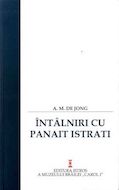
Jan Willem Bos immediately recognized the value of the texts he had found and wanted to make them available for a Romanian audience. He met Zamfir Bălan, the top Romanian specialist on the work and life of Panait Istrati, who agreed to publish the texts, almost 300 pages in total, at Istros publishing house, part of the “Carol I” Museum in Brăila. It made sense to publish the works in the port city of Brăila, because Istrati was born there and is one of its best known personalities. Bălan’s efforts to promote Istrati’s work, together with financial support of the Dutch Foundation for Literature, have played an important part in getting the book to the market. Întâlniri cu Panait Istrati by A.M. De Jong was published in 2019 with a foreword by Jan Willem Bos.
(Jan Willem Bos)
